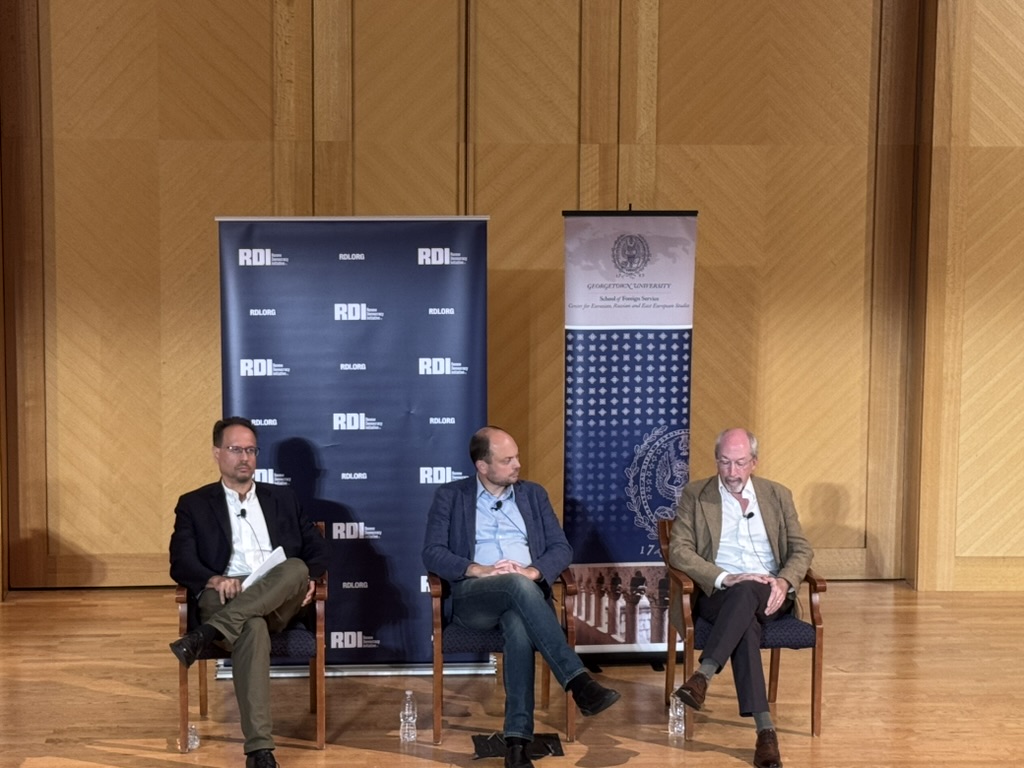A scholar and a dissident reflected on the lessons of the dissident movement in the Soviet Union at a discussion hosted by Georgetown University’s Center for Eurasian, Russian and East European Studies (CERES).

The event featured Dissident-in-Residence Vladimir Kara-Murza — a Russian opposition politician, journalist and historian who survived two poisonings and two years in Russian prison — and Benjamin Nathans, a historian and Pulitzer-Prize winning author, for a discussion on the legacy of Soviet dissent and its relevance today. Professor Michael David-Fox, the CERES director, moderated the conversation.
Kara-Murza said many of those who joined the dissident movement were trying to maintain their integrity despite the government’s oppression and corruption.
“Many of the people who joined the Soviet dissident movement were not trying to change the outside, but to try to remain an honest and decent person despite these surroundings,” Kara-Murza said at the event.
Nathans said legitimacy without the use of force is paramount to good governance and democratic rule.
“Legitimacy is so important to ruling without constantly using violence,” Nathans said. “That’s what makes it possible for the few to rule the many without constantly beating them up, is to have a certain legitimacy.”
Nathans added that the Soviet dissident movement was not looking for a revolution like other global movements of the time, but that they sought to add constraints to the system.
“Soviet dissidents, I would say, were allergic to the idea of revolution, including cultural revolution,” Nathans said. “They had lived through the aftermath of an extraordinarily violent revolution that had resulted in the imprisonment, exile and killing of millions of people, and the last thing they wanted was to echo that approach to power in any way.”
“The language they spoke was not of transcending the current reality or of transcending the current system, but of very cleverly leveraging the mechanisms of the system itself, especially the legal system, in order to place constraints on what the Soviet state could do to its own people,” Nathans added.
Kara-Murza said the lesson of the dissident movement is that fear is a personal choice.
“Fear, at the end of the day, is a personal choice,” Kara Murza said. “Yes, this regime will seek to make fear ever-present, but at the end of the day, it was up to each individual person to choose whether he or she agrees to be afraid.”
Kara-Murza added that another lesson from the dissidents is the value of supporting those who are afraid.
“When people are starting to be afraid, you have to come in, stand next to them and say, ‘Here I am — I’m not afraid,’” Kara Murza said. “And this, to me, perhaps, was the most powerful lesson from the Soviet dissident movement, that when people are becoming afraid, you have to stand next to us.”
Nathans said the dissident movement struggled to maintain a free Russia following the Soviet Union’s collapse due to a subversion of the rule of law.
“The Russia that emerged from the rubble of the Soviet Union was very free, but not very law-abiding, and then it became very unfree and not very law-abiding,” Nathans said. “But as so often happens in history, sometimes the unintended effects of ideas and movements are as powerful, or more powerful, than the goals that historical actors have in mind.”
Nathans added that the dissidents were able to flourish despite the repression of the regime.
“The Soviet Union was a purpose-driven society, and it attempted to instill in its citizens a higher calling,” Nathans said. “Dissidents were people who took that higher calling seriously, and one of the most fascinating things about them, and frankly about you, is how these islands of idealism are able to survive and in some instances, flourish.”
Kara-Murza said it is important not to be complacent, as every nation faces the threat of autocracy.
“It’s very important not to be complacent and not to be different now,” Kara-Murza said. “Just as there’s no nation on the face of this earth that is doomed to be an autocracy, there’s no nation that is guaranteed to be a democracy, whatever traditions it has and however long it’s had them.”